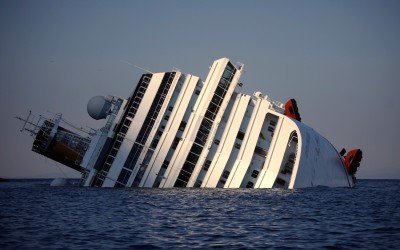
Francesco Schettino’s total prison term broke down this way: 10 years for the deaths of 32 passengers and crew members; five years for causing the shipwreck when he steered too close to Giglio Island, smashing into a rocky reef, one year for abandoning the luxury vessel when hundreds of people were still aboard, and one month for giving false information to maritime authorities about the gravity of the Concordia’s collision, which prosecutors said delayed the arrival of help.
The punishment, handed down by a three-judge panel, was 10 years short of what prosecutors had sought, and left some survivors and victims’ relatives wondering if justice was done.
“Thirty-two dead. That’s about six months for every person who died,” said Anne Decre, a Frenchwoman who managed to get aboard a lifeboat before the Concordia’s listing made it impossible to lower other lifeboats. Referring to the 16-year prison term, she was one of only a handful of survivors who came to court to hear the verdict.
She is pressing for better safety standards for cruise ships, and like other survivors, recalled how many passengers hadn’t received emergency drill practice after starting the Mediterranean cruise.
Keven Rebello’s brother, Russel Rebello, was a ship waiter who stayed aboard to lower the last of the lifeboats. His body was found only after the Costa Concordia was towed away from Giglio Island after the ship was set upright in a spectacular engineering.
“What’s important is not to forget this affair. Instead, if Schettino ends up in prison, after a while everyone will forget about him, just like they will forget about the victims,” Rebello was quoted as saying by the Italian news agency ANSA.
Refusing to comment on the sentence itself, Rebello added: “What matters is that this tragedy serves to make the (cruise) companies and commanders do what’s needed so (the tragedy) doesn’t repeat itself.”
Judge Giovanni Puliatti took more than a half-hour to read out all the names, one by one, of the survivors and dead, upon whose behalf civil suits were filed for damages from Costa Crociere Spa.
The total of all damages and court costs of the lawyers who brought the suits, was not immediately available. But most awards totaled tens of thousands of euros (dollars), far more than the 11,000 euros Costa paid to survivors who declined to press civil suits.
Schettino chose not to come to court for the verdict. Puliatti rejected the prosecutor’s request for the defendant’s immediate arrest. The judge noted that Schettino still had two levels of appeals to exhaust under Italian law before he must begin serving his sentence.
As they left the court, Schettino’s lawyers said they hadn’t yet spoken to him by phone.
Just before deliberations began, Schettino made a last-minute appeal to the court, claiming he was being “sacrificed” to safeguard the economic interests of his employer. He then broke down in sobs.
The reef gashed the hull, seawater rushed in, and the Concordia listed badly, finally ending up on its side outside Giglio’s port. Autopsies determined that victims drowned aboard ship or in the sea after either falling or jumping off the ship during a chaotic, delayed evacuation.
“My head was sacrificed to serve economic interests,” the 54-year-old Neapolitan seaman told the court.
Lawyers for many of the survivors and victims’ families have attached civil suits to the criminal trial to press the court to order Costa Crociere SpA, the Italian cruise company, to pay hefty damages. Their lawyers lamented to the court that no one from the cruise company’s upper echelons was put on trial.
Four Concordia crew members and Costa’s land-based crisis coordinator were allowed to plea bargain. None is serving prison time.
Costa Crociere’s lawyer at the trial, Marco De Luca, rejected the assertion that the company bore any blame in the shipwreck, and called the verdict “balanced.”
Cruise travel has been a growing part of tourism, one of Italy’s main industries. Costa Crociere SpA has been a big customer of an Italian state-controlled shipbuilder.
Trial testimony and evidence highlighted several mistakes and shortcomings that the defense — and plaintiffs’ lawyers — contended were beyond Schettino’s control. A helmsman botched Schettino’s orders immediately before and after the collision, and some crew members weren’t fluent in English or in Italian, the working language of the ship.
An emergency generator failed after the crash, and water-tight compartment doors didn’t work properly.
AP

Leave a Reply
You must be logged in to post a comment.